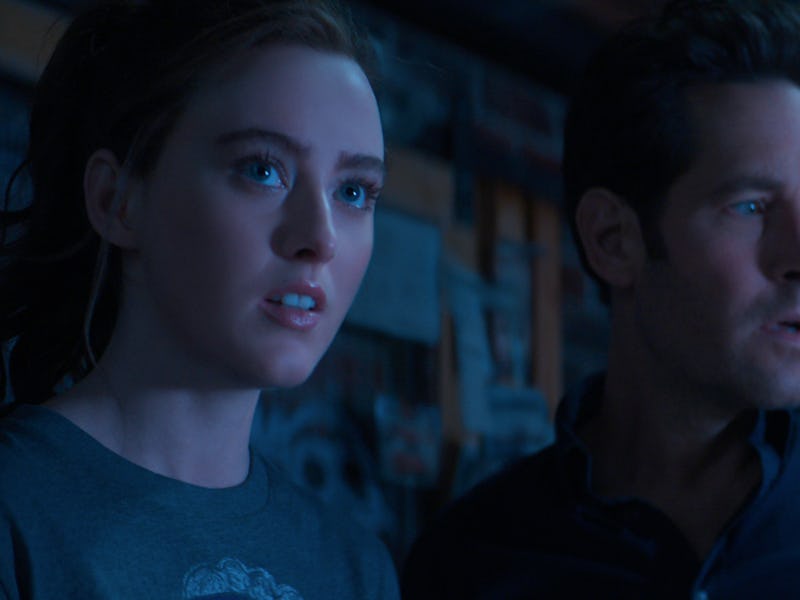Marvel's Inability to Explore the Blip Is Phase Four's Biggest Failure
One of the biggest, traumatic events in the MCU canon is glossed over endlessly. Why?

In a now infamous 1997 episode of The Simpsons, “The Itchy & Scratchie & Poochie Show,” Homer Simpson — who has inexplicably become the voice of the ill-received “Poochie” cartoon character — tries to save his job by pitching to a room of writers ways to elevate Poochie’s importance.
Instructs Homer: “Whenever Poochie’s not onscreen, all the other characters should be asking, ‘Where’s Poochie?’”
As is the case with The Simpsons, one could read Homer’s instructions as a prescient strategy deployed by the Marvel Cinematic Universe: Whenever the Blip is not onscreen, all the other characters should be asking, “What happened during the Blip?”
Throughout Marvel’s Phase Four, which began with 2021’s Black Widow and concluded with Black Panther: Wakanda Forever, the famously interconnected Marvel franchise took on a feudal approach to manage its many projects as it expanded from the big screen to Disney+. The result was a Phase Four that maybe had some individual pizazz — WandaVision, for example — but lacked unified cohesion and clear overall direction that audiences grew accustomed to in the build-up to Avengers: Infinity War and Avengers: Endgame.
With every team pursuing their own stories, one of Phase Four’s biggest black holes became “The Blip,” the sudden erasure of life in Avengers: Infinity War (a movie that will turn five years old this May). Based on a cataclysmic yet minor plot point in the Marvel comic The Infinity Gauntlet, the Blip is/was a widespread disaster in the canon of the MCU. Like a pandemic that killed millions, the Blip was a tremendous and sudden trauma.
The end of Avengers: Infinity War saw Thanos successfully carry out his mission to wipe out half of all life in the universe. Five years on, the MCU still hasn’t grappled with the full impact of “The Blip.”
Even now, Marvel fans have still not seen what life was like during the five years of the Blip. We can only relate, however bleakly, to how we lived when Covid-19 broke out in 2020. It’s not hard to imagine all those lives interrupted, pivotal moments and plans ground to a sudden halt while they’re all left to deal with lasting traumas they’ve not recovered, and perhaps never will.
After the Blip was undone in Endgame, a handful of instances alluded to its continuing to impact lives. In Spider-Man: Far From Home, Aunt May (Marisa Tomei) joked about losing her apartment. In Shang-Chi, the Blip is brought up as an excuse — by now Oscar-nominee Stephanie Hsu in a minor role — to not waste life with minimal aspirations. In The Falcon and the Winter Soldier, the title heroes confront a radical activist group who believed the relaxed national borders required during the Blip were better for humanity. (Or something. I still have no idea what the Flag-Smashers were on about.)
But aside from those and the first 30 minutes of Avengers: Endgame, the MCU has not explored the Blip in any meaningful way.
Phase Five has now started with Ant-Man and the Wasp: Quantumania, and the Marvel franchise is suddenly in a rush to make Kang the Conqueror happen. Now that Marvel has a new top priority, the train has left the station to really address the Blip, an event that was a big deal but should be a bigger deal, yet was glossed over despite its untapped potential.
Roughly the first 40 minutes of Avengers: Endgame are the best in the Marvel series. For once, the action slows down and the many characters left behind ask themselves, “What now?”
There’s maybe some truth to the possibility that, in the immediate aftermath of Avengers: Endgame, Marvel fans wanted to move on and not keep thinking about the same $2 billion movie. In another universe, this article would lament how much Marvel talked about the Blip too much and never moved on fast enough. But we instead live in this reality. The reality where Marvel spent a whole lot of time not setting up the Young Avengers, and then headed down the long road to a multiverse war we won’t see for another two, maybe three years.
I’m personally glad Marvel didn’t keep following Thanos or the Infinity Stones or whatever after Endgame. (That the Infinity Stones were office paperweights in Loki is a brilliant satire towards Marvel itself.) But I do lament how the widespread impact of the Blip still isn’t understood. No Marvel thing has spent any time during the years of the Blip, nor has any Marvel project shown how far and wide the Blip’s reach was felt. We don’t even know how many of the MCU’s newest characters were changed by the Blip. How did the Ten Rings operate during those years? How did Wakanda? In Ryan Coogler’s original draft of Black Panther: Wakanda Forever, the late Chadwick Boseman’s role of T’Challa would have directly grappled with the Blip as he lamented the lost time with his son. (Quantumania weirdly channels this story too, but it never fully delivers.) But because of the real-life loss of Boseman, Wakanda Forever was rebuilt and the only mention of the Blip is a passing mention of Thanos.
All signs point to the MCU being just fine as it marches forward to Avengers: The Kang Dynasty and Avengers: Secret Wars. Kang will probably do something as horrific as Thanos’ snap, and the MCU will have a new thing to launch or ignore stories from. But as the door is now shut on Phase Four, it’s a shame the MCU can’t, and won’t, find the time to honestly examine the nooks and crannies of its increasingly unwieldy universe.
This article was originally published on